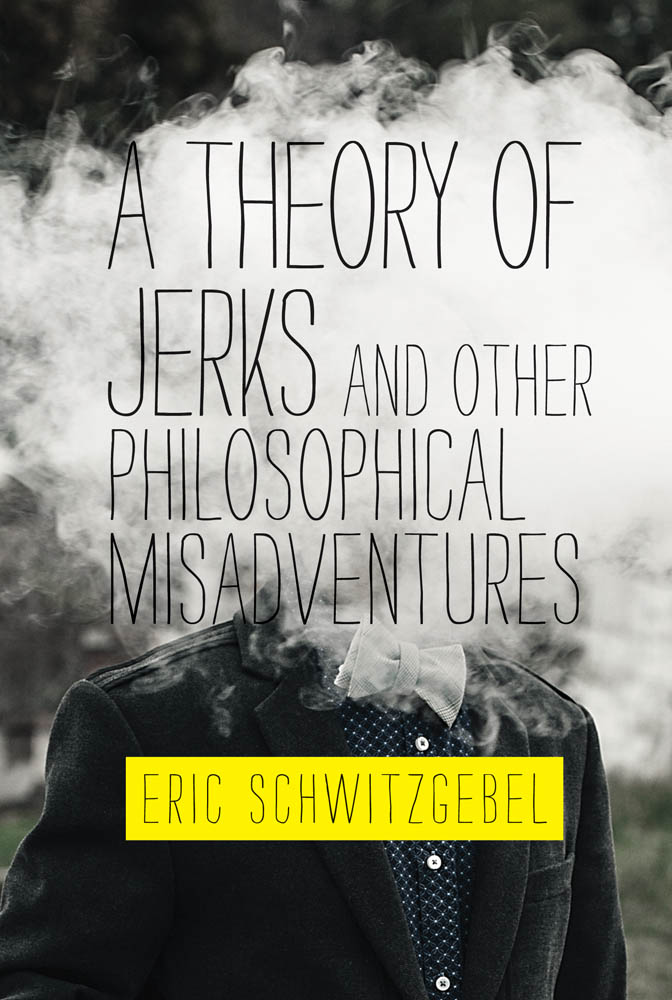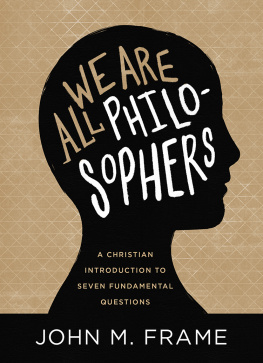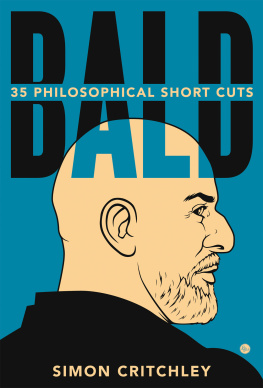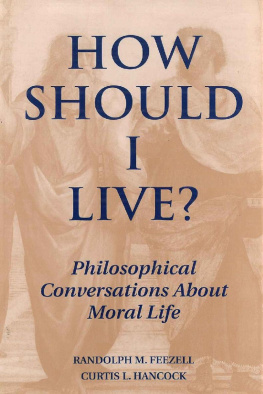
A Theory of Jerks and Other Philosophical Misadventures
A Theory of Jerks and Other Philosophical Misadventures
Eric Schwitzgebel
The MIT Press
Cambridge, Massachusetts
London, England
2019 Massachusetts Institute of Technology
All rights reserved. No part of this book may be reproduced in any form by any electronic or mechanical means (including photocopying, recording, or information storage and retrieval) without permission in writing from the publisher.
Library of Congress Cataloging-in-Publication Data is available.
10 9 8 7 6 5 4 3 2 1
ISBN: 978-0-262-04309-0
Retail e-ISBN: 978-0-262-35536-0
Library e-ISBN: 978-0-262-35535-3
MITP e-ISBN: 978-0-262-35534-6
In memory of my father, psychologist, inventor, parent, philosopher, and giver of strange objects
Contents
I enjoy writing short philosophical reflections for broad audiences. Evidently, I enjoy this immensely: Since 2006, Ive written more than a thousand such pieces, published mostly on my blog The Splintered Mind, but also in the Los Angeles Times, Aeon, and elsewhere. This book contains fifty-eight of my favorites, revised and updated.
The topics range widelyfrom moral psychology and the ethics of the game of dreidel to multiverse theory, speculative philosophy of consciousness, and the apparent foolishness of Immanuel Kant. There is no unifying thesis.
Maybe, however, there is a unifying theme. The human intellect has a ragged edge, where it begins to turn against itself, casting doubt on itself or finding itself lost among seemingly improbable conclusions. We can reach this ragged edge quickly. Sometimes, all it takes to remind us of our limits is an eight-hundred-word blog post. Playing at this ragged edge, where I no longer know quite what to think or how to think about it, is my idea of fun.
Given the human propensity for rationalization and self-deception, when I disapprove of others, how do I know that Im not the one who is being a jerk? Given that all our intuitive, philosophical, and scientific knowledge of the mind has been built on a narrow range of cases, how much confidence can we have in our conclusions about the strange new possibilities that are likely to open up in the near future of artificial intelligence? Speculative cosmology at once poses the (literally) biggest questions that we can ask about the universe and reveals possibilities that threaten to undermine our ability to answer those same questions. The history of philosophy is humbling when we see how badly wrong previous thinkers have been, despite their intellectual skills and confidence.
Not all of my posts fit this theme. Its also fun to use the once-forbidden word fuck over and over again in a chapter about profanity. And I wanted to share some reminiscences about how my father saw the worldespecially since in some ways I prefer his optimistic and proactive vision to my own less hopeful skepticism. Other of my blog posts I just liked or wanted to share for other reasons. A few are short fictions.
It would be an unusual reader who enjoyed every chapter. I hope youll skip anything you find boring. The chapters are all freestanding. Please dont just start reading on page 1 and then try to slog along through everything sequentially out of some misplaced sense of duty! Trust your sense of fun (chapter 47). Read only the chapters that appeal to you, in any order you like.
Riverside, California, Earth (I hope)
October 25, 2018
Picture the world through the eyes of the jerk. The line of people in the post office is a mass of unimportant fools; its a felt injustice that you must wait while they bumble with their requests. The flight attendant is not a potentially interesting person with her own cares and struggles but instead the most available face of a corporation that stupidly insists you stow your laptop. Custodians and secretaries are lazy complainers who rightly get the scut work. The person who disagrees with you at the staff meeting is an idiot to be shot down. Entering a subway is an exercise in nudging past the dumb schmoes.
We need a theory of jerks. We need such a theory because, first, it can help us achieve a calm, clinical understanding when confronting such a creature in the wild. Imagine the nature documentary voice-over: Here we see the jerk in his natural environment. Notice how he subtly adjusts his dominance display to the Italian-restaurant situation... And secondwell, I dont want to say what the second reason is quite yet.
As it happens, I do have such a theory. But before we get into it, I should clarify some terminology. The word jerk can refer to two different types of person. The older use of jerk designates a chump or ignorant fool, though not a morally odious
The jerk-as-fool usage seems to have begun among traveling performers as a derisive reference to the unsophisticated people of a jerkwater town, that is, a town not rating a full-scale train station, requiring the boilerman to pull on a chain to water his engine. The term expresses the traveling troupes disdain. (In English, consider rude, villain, and ignoble.) It is the immoral jerk who concerns me here.
Why, you might be wondering, should a philosopher make it his business to analyze colloquial terms of abuse? Doesnt the Urban Dictionary cover that kind of thing quite adequately? Shouldnt I confine myself to truth, or beauty, or knowledge, or why there is something rather than nothing? I am, in fact, interested in all those topics. And yet I see a folk wisdom in the term jerk that points toward something morally important. I want to extract that morally important thing, isolating the core phenomenon implicit in our usage. Precedents for this type of philosophical work include Harry Frankfurts essay On Bullshit and, closer to my target, Aaron Jamess book Assholes. Our taste in vulgarity reveals our values.
I submit that the unifying core, the essence of jerkitude in the moral sense, is this: The jerk culpably fails to appreciatethe perspectives of others around him, treating them as tools to be manipulated or fools to be dealt with rather than as moral and epistemic peers. This failure has both an intellectual dimension and an emotional dimension, and it has these two dimensions on both sides of the relationship. The jerk himself is both intellectually and emotionally defective, and what he defectively fails to appreciate is both the intellectual and emotional perspectives of the people around him. He cant appreciate how he might be wrong and others right about some matter of fact, and what other people want or value doesnt register as of interest to him, except derivatively upon his own interests. The bumpkin ignorance captured in the earlier use of jerk has become a type of moral ignorance.
Some related traits are already well-known in psychology and philosophythe dark triad of Machiavellianism, narcissism, and psychopathy; low Agreeableness on the Big Five personality test; and Aaron Jamess conception of the asshole, already mentioned. But my conception of the jerk differs from all of these. The asshole, James says, is someone who allows himself to enjoy special advantages out of an entrenched sense of entitlement.helping to explain some of the peculiar features of this type of animal, as we will see.
The opposite of the jerk is the sweetheart. The sweetheart sees others around him, even strangers, as individually distinctive people with valuable perspectives, whose desires and opinions, interests and goals, are worthy of attention and respect. The sweetheart yields his place in line to the hurried shopper, stops to help the person who has dropped her papers, calls an acquaintance with an embarrassed apology after having been unintentionally rude. In a debate, the sweetheart sees how he might be wrong and the other person right.
Next page










